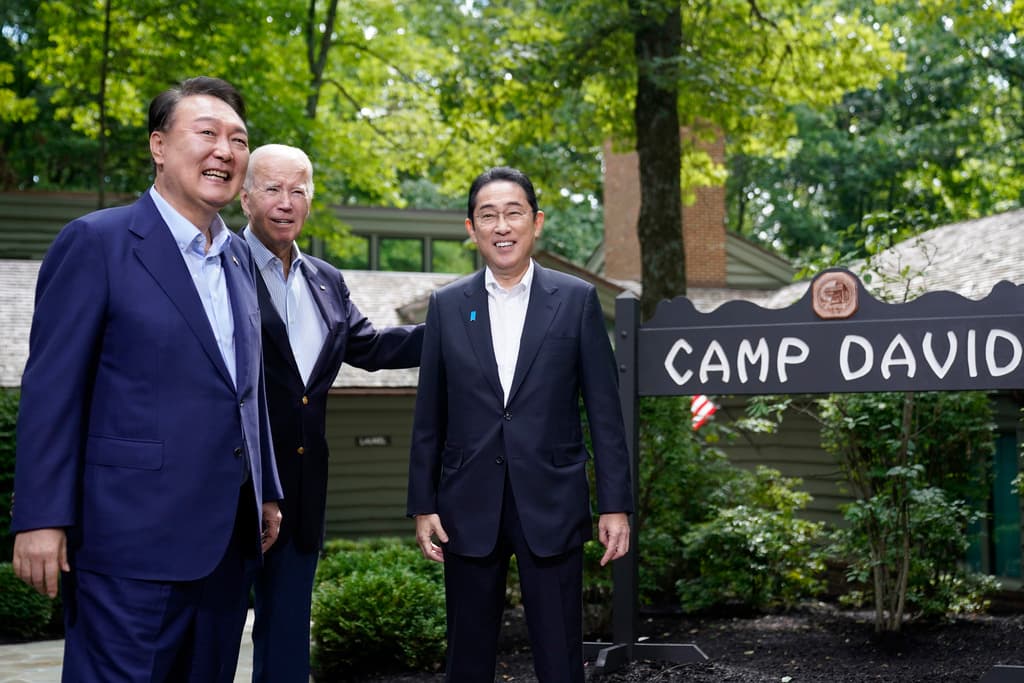Biden, East Asian Leaders Pose Fresh Challenge to Communist China’s Expansionist Aims
In a nod to threats against Taiwan’s independence, Biden vows America and its allies will ‘counter’ any ‘incursion’ there.

SEOUL — President Biden and the leaders of Japan and South Korea say their unprecedented trilateral summit was “not about China,” but their show of unity at Camp David poses a fresh challenge to Beijing’s expansionist aims in East Asia.
That assurance flew in the face of the summit’s final statement targeting Communist China and North Korea in strong if nonspecific language while pledging unremitting support of the island democracy of Taiwan, which President Xi has vowed to reclaim.
While Mr. Xi regularly orders fighter planes and navy vessels into the skies and seas surrounding Taiwan, Mr. Biden, Prime Minister Kishida of Japan, and President Yoon of South Korea, in their declaration of “Camp David Principles,” reaffirmed “the importance of peace and stability across the Taiwan Strait” between the island and the mainland.
There was, they said, “no change in our basic position on Taiwan.” The statement, bereft of details, did not go beyond previous vows in one-on-one meetings between the leaders. Yet the statement suggests a unity of purpose in holding back China’s ambitions to expand its influence in the region.
Just as strongly, but equally vaguely, the three repeated familiar calls for North Korea’s “complete denuclearization” while urging the North “to abandon its nuclear and ballistic missile programs.” North Korean missiles, they noted, “pose a grave threat to peace and security on the Korean Peninsula and beyond.”
In response to the summit, China suggested America was stirring trouble in the region. “Attempts to form various exclusive groups and cliques and to bring bloc confrontation into the Asia-Pacific region are unpopular and will definitely spark vigilance and opposition in the countries of the region,” a foreign ministry spokesman, Wang Wenbin, said.
If the Camp David demands seemed familiar, the mere fact that Mr. Biden had managed to get Messrs. Kishida and Yoon together appeared as a diplomatic triumph for all of them. Enhancing the show of unity, they promised to set up a hotline for instant communications and to stage similar summits annually.
The level of enthusiasm, though, was considerably blurred when it came to Russia’s invasion of Ukraine. Superficially, Mr. Biden managed to win over both of them to at least a show of support, but not much more.
“Russia’s war of aggression against Ukraine and nuclear provocations test us,” they agreed in their statement on the “Camp David Spirit” — a term reflecting the atmosphere of bonhomie engendered in previous summits at the presidential retreat going back to President Roosevelt’s meeting with Winston Churchill 80 years ago.
“This is a moment that requires unity and coordinated action from true partners,” they agreed, “and it is a moment we intend to meet, together.” Just how they would meet that “moment” was left unstated — a sign of the reluctance of Korea and Japan to offer more than highly limited aid to Ukraine.
The reference to Ukraine was slipped in as a bridge to the next sentence, which got to the heart of what the meeting was about, the trilateral relationship.
“We believe our trilateral partnership advances the security and prosperity of all our people, the region, and the world,” the statement said. It was “in this spirit” that “President Biden commended President Yoon and Prime Minister Kishida for their courageous leadership in transforming relations between Japan and the ROK,” initials for South Korea’s formal name, Republic of Korea.
The mere fact that all three leaders could sit side by side, presumably nodding in agreement to language drafted by top aides and reviewed by them before they took off for the summit, was enough to justify the repetition of phrases we have often heard before.
“With the renewed bonds of friendship — and girded by the ironclad U.S.-Japan and U.S.-ROK alliances — each of our bilateral relationships is now stronger than ever,” the statement declared. “So too is our trilateral relationship.”
Mr. Biden went to still greater rhetorical lengths when he stood before the press, Mr. Yoon to his right, Mr. Kishida to his left, hyping the achievement. The summit was a “historical moment,” he told the journalists arrayed before him and the millions catching the act on TV. “Our world stands at an inflection point.”
Still not getting into hard facts, he spread the word “we’re elevating our defense” to “unprecedented levels” — thanks, of course, to “trilateral cooperation.” His language got slightly tougher when it came to the Taiwan Straits, where he intimated Washington and its partners would “counter incursion.”
Ditto the South China Sea, which China claims as its own. “We’ll stand up for international law” and “the peaceful resolution of disputes in the South China Sea,” he said, glossing over Chinese challenges and warnings telling American planes and ships to go away.
The fact that Mr. Biden had gotten the leaders of Japan and South Korea to meet gave him enough confidence to talk in superlatives, always without much to support the flowery words. America and its northeast Asian partners, he was sure, were “unwavering in our unity and unmatched in our resolve.”
Mr. Yoon, talking to the press just after Mr. Biden, summarized the real success of the summit: “Camp David will be remembered as an historic place, the very first stand-alone trilateral summit” — opening “a new chapter in trilateral cooperation.”
Mr. Kishida, up next, was only slightly more specific. “We agreed to maritime support particularly with regard to Pacific countries,” he said, hinting at Japan’s concern over China’s growing presence in the southern Pacific.
Camp David had provided a “framework for trilateral cooperation,” Mr. Kishida said. “We will consider the Camp David principles as an historic turning point” — music to Mr. Biden’s ears.

